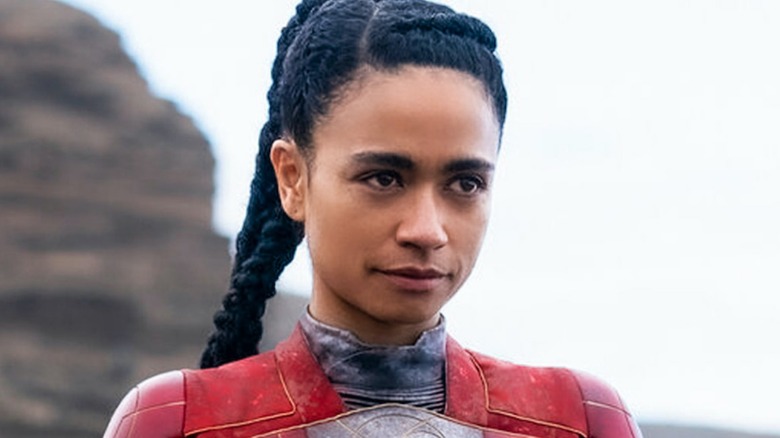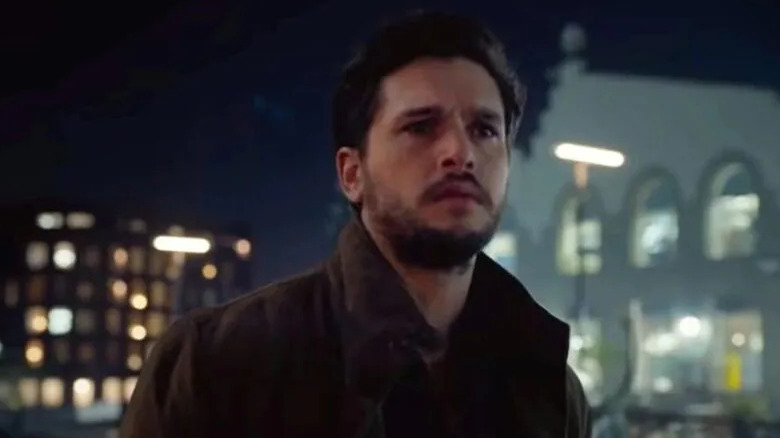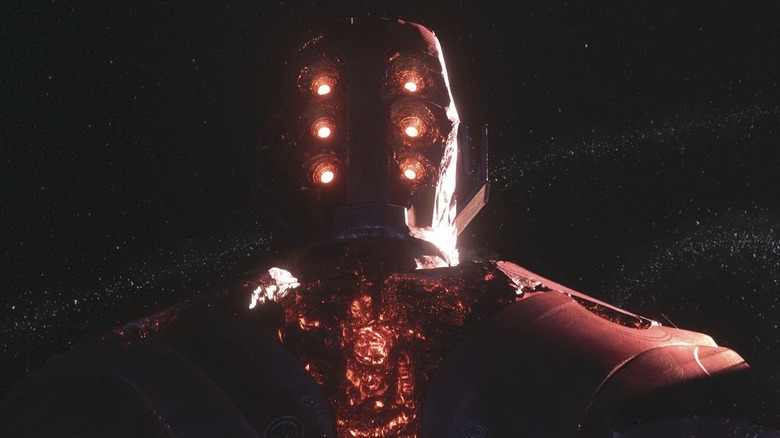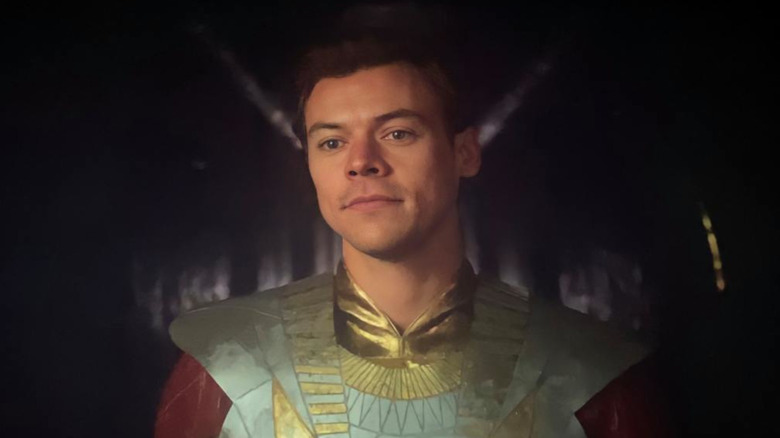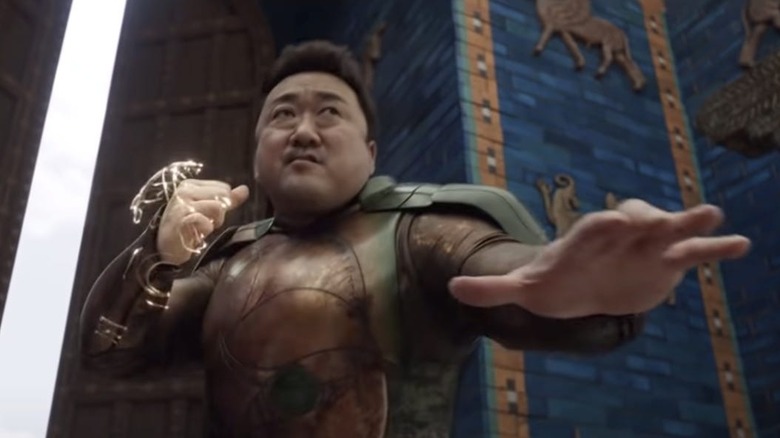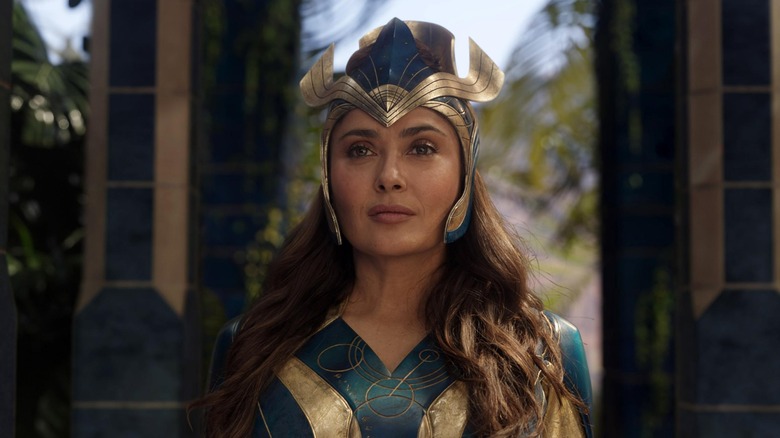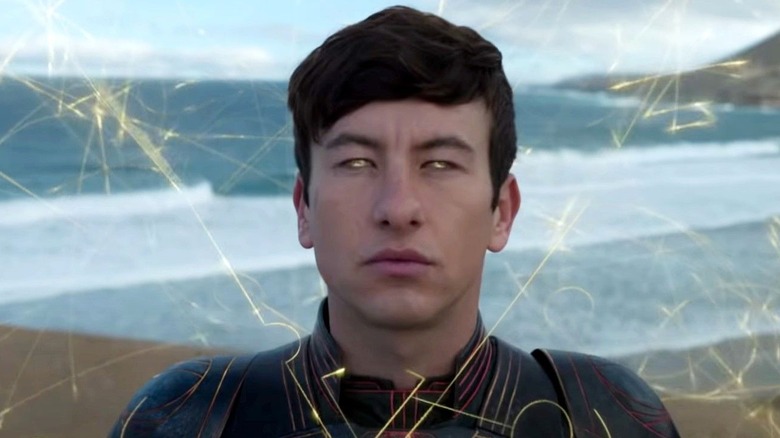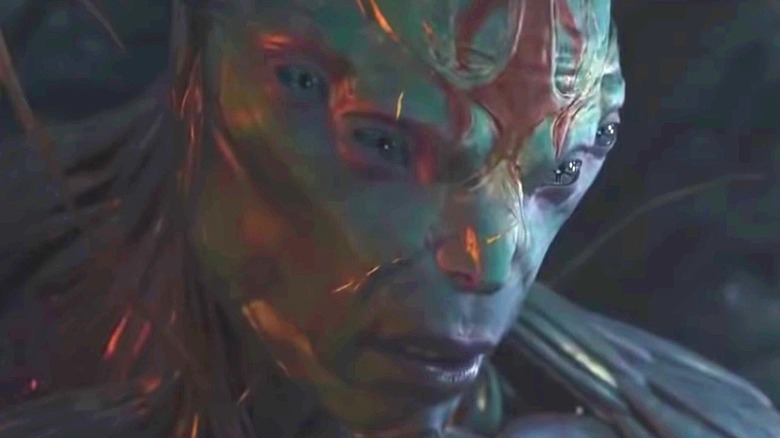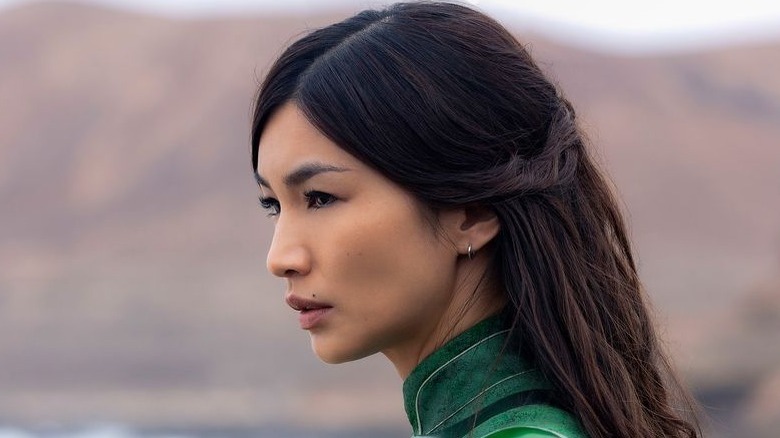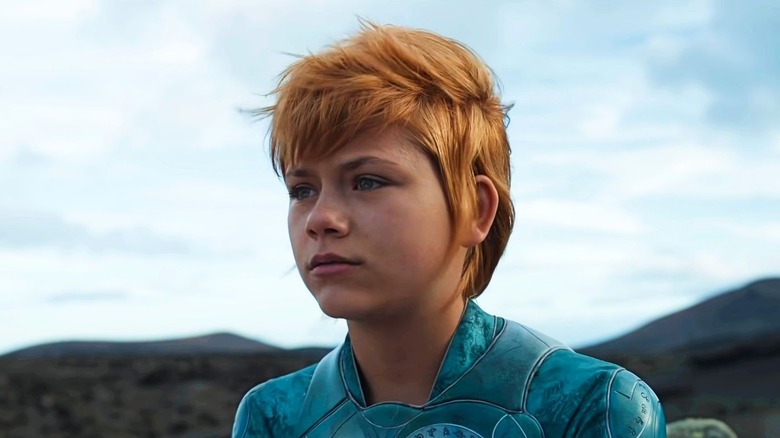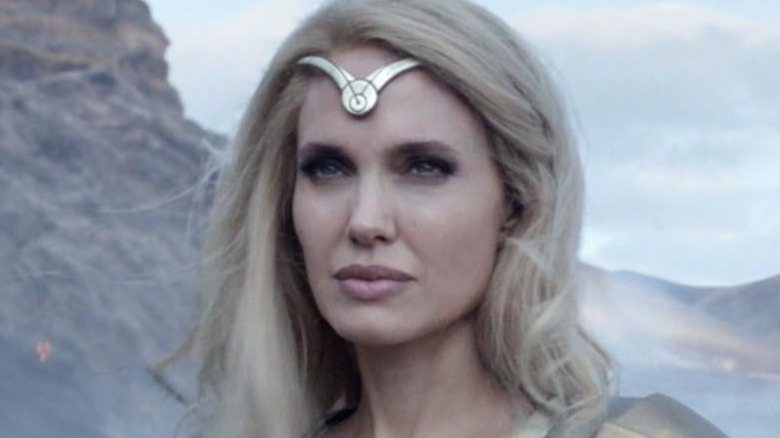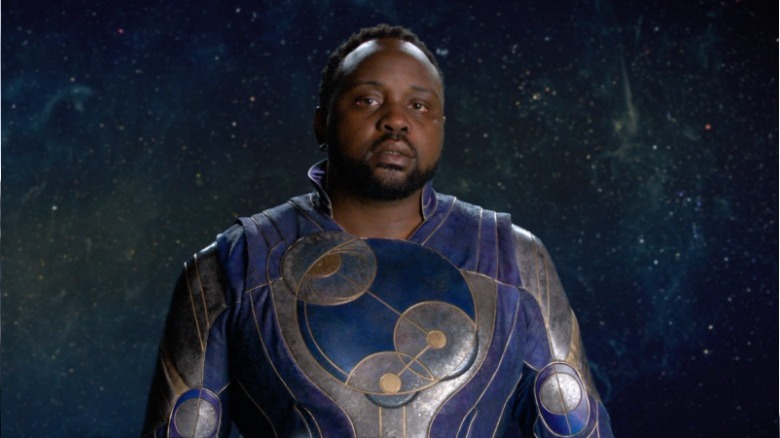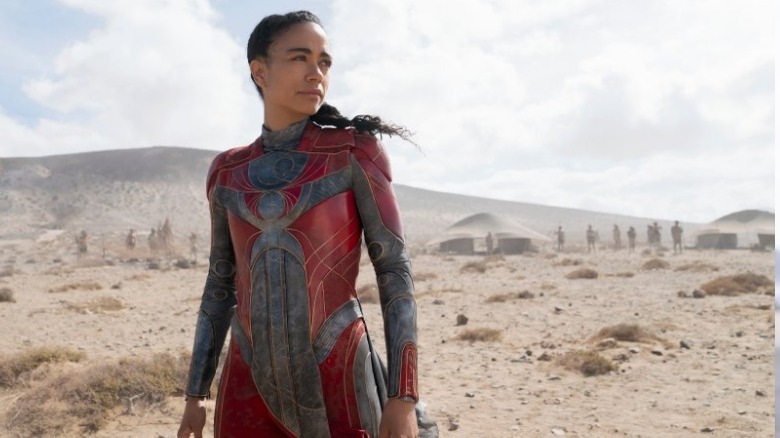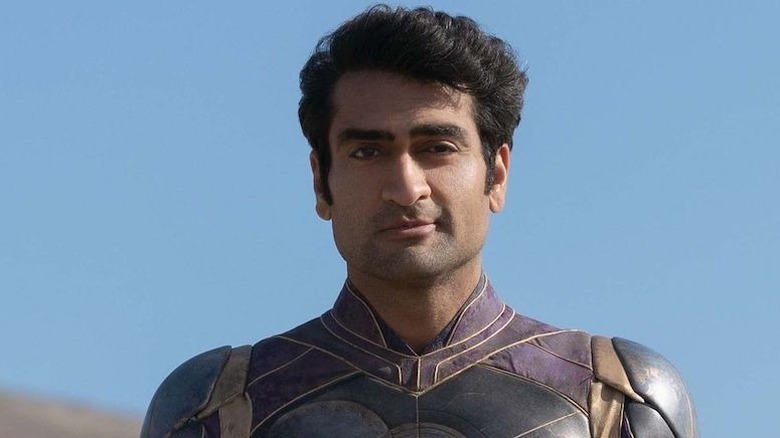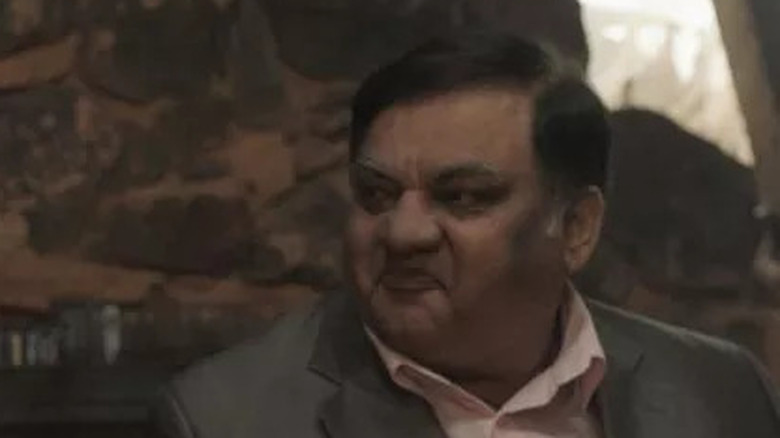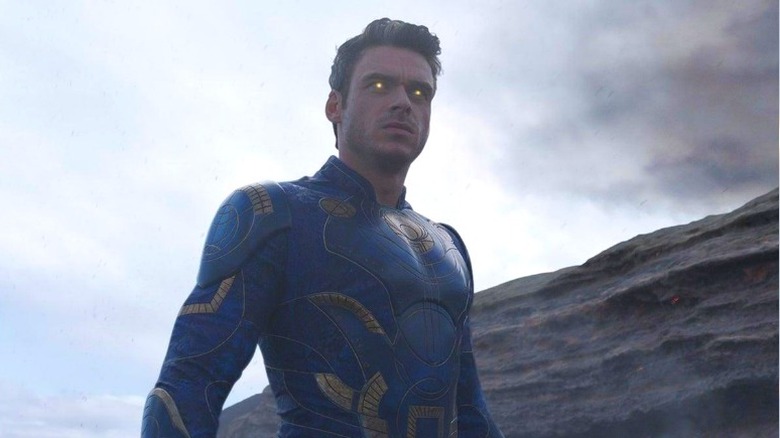The Best Characters In Eternals Ranked
The primary tenet of Blake Snyder's "Save the Cat," a book about writing successful movies, is "give me the same thing ... only different." Stan Lee, co-creator of many of Marvel's most popular characters, also believed this implicitly. He claimed that the secret to Marvel's success was its "illusion of change," the feeling that events were altering a comic book character irrevocably, but actually weren't. Now, Marvel makes the most successful and impactful Hollywood blockbusters, and "the same thing ... only different" and "the illusion of change" are the MCU's bread and butter.
By contrast, the discourse surrounding Chloe Zhao's "Eternals" has centered on how different it feels from other Marvel films. The irony of that is that many of the Eternals are "same but different" versions of both mythological characters and their comic book counterparts. To confront them as realized in Zhao's film is to reckon with continuity-shifting changes to characters who are cultural building blocks.
But, as the fresh takes on the characters in "Eternals" are introduced to audiences worldwide, Zhao has the chance to tell new stories that resonate with millennia's worth of history — and there's nothing the same about that. Here, then, are the best characters in "Eternals," ranked.
Note: The rest of this article contains major spoilers for "Eternals."
15. Dane Whitman
Dane Whitman is Kit Harrington in a sweater. Kit Harrington in a sweater is Dane. They're the same picture. This threatens to be a glib assessment of both Harrington and his character, but, as the second of the two "Eternals" credits scenes reveals, Dane looks set to inherit the mantle of the Black Knight soon. That will make him far more interesting.
For now, though? Dane is still the thing which Kit Harrington has been for the majority of his career: a counterpoint to actor Richard Madden. Given how crowded "Eternals" is, that's not an objectively bad lane for either Harrington or Whitman. But even if it's a solid place for the character to temporarily live, it does make Dane the least interesting person in the room. He's a man whose family history is "complicated" because the path that the Marvel Universe is following necessitates it. Dane is very, very boring ... but only for now.
14. Arishem
Arishem is dull by design. That's a bizarre sentence to write about a galaxy-sized, crimson Celestial with six burning furnaces for eyes. But one of the core themes of "Eternals" is the potential pitfalls of unwavering worship, and Arishem and his interests are mere MacGuffins. We are made to understand that Arishem is awe-worthy, a phantasmagorical space god whose purpose is nothing less than preserving sentient life in the universe. What Arishem winds up being — with a purposefully less than satisfactory explanation– is a pro-life judge who sends the Eternals to Earth as freshly-brainwashed doulas.
When Arishem's true designs are revealed, we see a team of 7,000-year-old beings struggle with both the reason why they were made and what they should do with that knowledge. This inter-group tug-of-war transforms "Eternals" into, happily, the largest-budgeted pro-choice blockbuster ever filmed. It also renders Arishem boring. He is an elder Celestial who uses power as an argument to justify his grand plan. That makes him terrifically and totally uninteresting.
13. Eros (Star Fox)
The problem with being perpetually online is that you're very likely to read articles or see tweets on your timeline that are full of spoilers. So, here's a major warning in advance: We're about to spoil the heck out of the first post-credits scene in "Eternals." Here it goes: Harry Styles is Starfox — and no, not the Nintendo character.
So, why is Starfox a better character than, say, Arishem or Dane Whitman? For one, because Starfox's existence in the MCU is a boon for future projects. In a shared universe that explores themes of familial connection and trauma, introducing the swaggering younger brother of the universe's most notable villain seems brilliant. For another, Starfox's emotion-manipulating powers have led to some dark, even queasy storylines in Marvel Comics lore. The possibilities for him are head-spinning.
Lastly, casting Styles is a masterclass in shrewdness. Styles is a cultural icon whose appeal transcends Marvel Comics, and who will likely be immensely popular for the next decade and change whether or not he ever appears in another superhero flick. Styles' Starfox is an investment in Marvel's legacy. Based on this appearance, his future looks bright.
12. Gilgamesh
It is not necessary that the Eternals of Chloe Zhao's film be cut-and-dry extensions of their mythological counterparts. That said, they must be in concert with them. If a man named Michael Jordan happens to be a pretty good accountant, at some point someone will, maybe without meaning to, equate his solid number-crunching with the Michael Jordan's brilliance in the paint. There doesn't need to be an explicit connection between the two. They share a name. Connections are going to be drawn anyway.
Given that, Gilgamesh in "Eternals" suffers simply because "The Epic of Gilgamesh" is pretty darn extraordinary. If you've never read the Sumerian tales that make up the legend's literary exploits, Gilgamesh may be higher on your ranking than on mine, because you'll be less disappointed that he becomes the squad's proverbial Agent Coulson before developing much as a character.
Gilgamesh's passing brings the Eternals together. Unfortunately, it also means that a legend's time on screen is cut short. It's a nice riff, but one too brief to yield a truly great character.
11. Ajak
"Dream of better lives, the kind which never hate," Modern English's smash hit "I Melt with You" says. "Trapped in a state of imaginary grace ... I made a pilgrimage to save this human race ... never comprehending the race has long gone by."
I doubt that this song was on Chloe Zhao or the other "Eternals" writers' minds when they plotted out Ajak's arc. That said, its lyrics strike at the heart of the Ajak's journey. Ajak arrives on Earth with a dream. The grace she gifts her fellow Eternals, however, is imaginary. She lets them believe their purpose is noble; she should know better. And when she begins the long trip towards saving the human race instead, she doesn't envision a world in which her change of heart is rejected by a man, leading to heartbreak and death.
It's the stuff of classic pop songs. Unfortunately, because of the labyrinthine structure that "Eternals" employs, Ajak's story lacks a hit-making punch. We spend little time with Ajak and, as such, she's more effective as a thought exercise than a major player in Zhao's film. Selma Hayek brings her A-game to every moment, but it doesn't stop Ajak from being the cinematic equivalent of a good hook without a chorus. Here's hoping that she gets one soon.
10. Druig
One question plagued every press junket or article preceding the release of "Eternals": How would the movie handle the Thanos of it all? It's a reasonable question when the continuation of your massive, multi-platform storytelling franchise becomes incumbent on the introduction of new characters and a handful of all-powerful robot gods that didn't stop The Mad Titan (or war, disease, and suffering in general).
Thankfully, Druig (Barry Keoghan) is the Eternal who asks these questions of himself during Zhao's film. Druig is often shown preventing (or instigating) violence throughout "Eternals." He possesses the humans in order to swiftly enact his will. During the fall of Pompei, Druig briefly takes over warring armies to an effort to halt the city's destruction. That he is held in check by Ajax (Salma Hayek) foreshadows both the truth of the team's mission and also why Druig parts with them.
Sadly, in the effort to introduce so many new characters, Druig's post-exile life is less compelling than it could be. In comics lore, he works for the KGB. He is referred to as the Devil himself. In "Eternals," Druig is a brooding misdirection, one brought to life by Keoghan, but with little help from the film he appears in. Like so many other enigmatic mid-tier MCU characters, Druig will benefit from expanded time on screen. For now, he's little more than a necessary, compelling conduit for the audience's most pressing questions.
9. Kro
The Eternals and the Deviants were both created by Arishem as a means to a mad god's end. That suggests a world in which the Eternals and Deviants, knowing the truth of their existence, could choose solidarity and fight Arishem together. That sort of twist rarely happens in superhero stories or movies, and it doesn't in "Eternals," either. What does happen, though, is almost as compelling.
At the film's midpoint, Deviant leader Kro (Bill Skarsgard) and his army lay siege to Druig's forest encampment. During that skirmish, Kro beats Gilgamesh in combat, consuming both his life force and his super-strength. But Kro also absorbs Gilgamesh's memories and, in a moment that presents understanding as a kind of evolution, offers radical empathy to his Eternal companion, Thena, in place of violence.
It's a breath-stealing sequence, not only for the shock of its sentiment but also for the moral compass it suggests. In "Eternals," villains aren't mustache-twirling reprobates; they're individuals who have been granted access to devastating truth. How each character handles the weight of their knowledge defines their placement on the good guy-bad guy axis. And Kro, faced with the chance to act compassionately, selects emotional exploitation. He twists the life Gilgamesh and Thena shared into a metaphoric knife that punctures Thena's resolve. Villainous? Yes, but also truly fascinating.
8. Sersi
Sersi has a Captain Marvel problem.
Sersi, like Captain Marvel, is an unequivocal force. Her mind is elastic. Her powers have no easily identifiable limit. She proves herself the correct choice to lead the team in its abortion of Tiamut, and has the capacity to forgive Sprite and Ikaris for their misgivings in its wake. Sersi is incredible.
Unfortunately, "Eternals" renders her less incredible in practice than she is on paper. Like Captain Marvel, Sersi is an amnesiac whose lost memories hide dark, dangerous secrets. Until she discovers them, she's ostensibly a cipher torn between the strapping, Superman-like Icarus and the charming, Clark Kent-ish Dane. After the truth about Sersi is revealed, she becomes the engine driving the movie towards its finish, more beholden to plot machinations than character development. The same thing happened to Carol Danvers. Sersi and Carol are both tremendous (and have made strong, lasting impressions on younger viewers), but they land less strongly than they ought to.
There is strong reason to believe Captain Marvel will achieve higher liftoff as a character in Nia DeCosta's "The Marvels." The same can be said of Sersi, whenever the Eternals return. But, as a character observed in a vacuum, Sersi struggles to find gravity despite being at the center of the film. I wish I could have placed her higher.
7. Sprite
There is a lot of chatter online about whether Chloe Zhao made a successful movie, or whether it's substandard Marvel fare featuring natural landscapes. Both of these points, however valid, miss the grace notes that make "Eternals" an unmistakable Chloe Zhao production. Both "The Rider" and "Nomadland" plumbed the inherent intimacy of meaningful connection and brought relationships that were unconventional yet unmistakably true to the screen. "The Rider" gave us Brady and Lane, plus his horse. "Nomadland" had Fern and Dave. In "Eternals," Zhao shows us a relationship that cannot come to pass between two ageless constructs realized by a leading man and a 15-year-old girl.
To be clear, Sprite (played by Lia McHugh) is not 15 years old, a fact "Eternals" establishes from the jump. But as delicately realized by McHugh and the "Eternals" writers, she is a portrait of teenage angst stretched over 70 centuries. She is roiling, heartbroken, and bitingly sarcastic; she betrays herself by being true to herself. At no point during the film (which is, again, a Marvel blockbuster) is Sprite discomforting for the audience to spend time with. She realizes some of the film's most existentially shattering questions while generally being awesome. There should be a bit more chatter about her, please.
6. Thena
In Angelica Jade Bastein's searing, thoughtful appraisal of "Eternals" for Vulture, she laments that the film's actors "strain to find a way to stand out and add the touching foibles that make a superhero character memorable." I understand where she's coming from. On the one hand, it's sensible to argue that "Eternals" doesn't utilize, say, all-time A-tier movie star Angelina Jolie effectively enough. Jolie mostly comes off the proverbial bench to anchor a touching subplot about mental illness and the casual abuses of those who work for omnipresent forces ("Nomadland," anyone?). For my money, though, it's the fact that Jolie almost entirely relegates herself to supporting work that makes her effective.
At this point in time, a Marvel movie will always function as a treatise on movie stardom. Audiences expect the films to do one of two things: mint new stars, or reignite the careers of older ones. Jolie fits neither of these bills. Instead, "Eternals" sees one of the most vibrant screen presences of the last 30 years fall from grace mid-movie, and spend the rest of its runtime vacillating between being broken, capable, and absolutely butt-kicking. Jolie highlights Thena's speedy swings between assuredness and madness, maintaining grace even as her body falls apart. Thena speaks between the film's lines, and Jolie makes it easy for us to read what's written there. Thena is memorable, just not in a mighty Marvel way.
5. Phastos
As previously mentioned, the discourse around "Eternals" has been by turns frustratingly reductive or reductively performative, an opportunity for writers and armchair critics to sound off on any number of hot-button issues.
Phastos' sexuality is one of them. So, let's not narrow Phastos' character down to his sexual orientation alone (although representation, in fact, totally rules). Let's celebrate Phastos because he's an intelligent, anxious, powerful, sensual, gay, and hysterical man who's so ahead of the curve that his decisions lead to progress, then destruction, and then back again. It's a wild arc and, questionable storytelling decisions aside, one that plays out with cinematic verve in its heavily truncated screen time.
More than anything, Phastos is a character who reveals the best of what humanity can be through every action he takes. He endlessly strives for improvement; his instinct to protect his family leads to him being sheltered for decades, yet represents the closest encapsulation of what love means to "Eternals" as a movie. Taken as a tandem, he and Karun form the North Stars that guide the Eternals. The discussion about how wonderful that is should be pretty clear-cut.
4. Makkari
An audience favorite emerges from every Marvel movie. Early internet buzz pegged Kumali Nanjiani's Kango as the winner; trailer reactions hinted that Brian Tyree Henry had a shot as Phastos. But, as several viral tweets made it clear over release weekend, the breakout star of "Eternals" is Makkari. This is her moment.
When ranking these characters, it's difficult to separate the performance from the character as written. So, let's get this out of the way: There is zero doubt that actress Lauren Ridloff speeds away with this movie. Her performance is laced with personality and spunk, the equivalent of exploding a 1,000-watt bulb on screen so that the filament can burn unencumbered. It's sterling work.
As a character? That's a little more complicated. Makkari in "Eternals" is nothing like her large, blonde comic book counterpart. That's great! But it ostensibly makes Ridloff the character, one who's main defining traits are a gorgeously spare but specific intimacy with Druig and the choice to abandon humanity (there appears to have been more to this that met the eye, in fact). These are both lovely, wonderful touches, but they're rendered more wonderful by Ridloff's work than the script itself. Still, she lingers in the heart and mind long after the final credits roll, an ever-rewarding testament to the power of representation on screen.
3. Kingo
"Eternals" was marketed as a wild departure from other Marvel movies. A year and a half before its premiere, it was revealed that Chloe Zhao's film would contain a Bollywood number, something only rarely found in Western cinema and entirely absent from comic book movies. What's wild about that scene, though, is that it encapsulates all of the elements that makes its star, Kingo, great.
Because he's immortal, Kingo (Kumail Nanjiani) becomes not just one but multiple Bollywood legends over time. That leads him to commodify himself, to dull the spark that makes him special in order to present himself as an accessible package. Given that, the most obvious development would be for Kingo to miss a step in his return to action. He doesn't. In fact, Kingo sells out, and is not punished for doing so, either by the movies or his peers. He is a character of conviction, even when those convictions are decidedly capitalist. He is funny and wise, but also blatantly self-interested. It's clear that Kingo has affection for Karun, but Karun remains his valet, even when the world is ending.
Kingo is an incredible enigma who only feels knowable because the immeasurably personable Nanjiani is playing him. Kingo is a tremendous character and, as importantly, one who is truly different.
2. Karun
"Eternals" works as a critique of institutions and systems that employ others to spread their gospels under false pretenses; one of these institutions is Marvel itself. Many sites, including this one, have offered exhaustive looks into Marvel's relationship with the U.S. military, and whether the films they release function as propaganda. Zhao is keenly aware of this, and reveals the complex conversation she's had with herself through Kingo's valet, the exuberant, camera-wielding Karun.
A valet is a position of servitude. Karun serves Kingo, an Eternal who has come to double as the largest Bollywood star of multiple generations. He is the smallest cog in a machine that powers a commercial empire that he will never see the fruits of, and that he may labor for indefinitely. It's possible that Karun never actually shows the audience how he feels about his position. What he does do, however, is film the Eternals' exploits with genuine joy.
Through the eyes (and lens) of Karun, we are reminded how and why big superhero movies matter. This is shown by a character who could be forced into the woodwork, but isn't thanks to his resourcefulness (seriously, where do all those cameras come from?) and the strength of his personality. We are given a common man who single-handedly reminds the Eternals why life is worth fighting for. Karun is the heart of "Eternals." Simply put, he rules.
1. Ikaris
The Eternals made Icarus up. That's canon in the MCU: The myth of Icarus was inspired by Ikaris (Richard Madden), but Ikaris isn't Icarus — until the moment he is.
It doesn't feel wonderful ranking Ikaris number one on this list. He embodies the worst of what blind faith can lead to, and is a pretty depressing hang. He's willing to destroy everything and everyone for what he was told to believe in millennia ago. But Ikaris is also a man in love, a boy who grows into his better self by being in the world with someone he cares for. When Ikaris is confronted with the choice of killing Sersi or birthing Tiamut, the choice is excruciating but clear: apologize and die.
In his final moments, Ikaris proves that Marvel has never truly made a tragedy before "Eternals" The illusion of change is too necessary. After the Vision is ripped from existence in "Avengers: Infinity War," he gets a series-long eulogy in "WandaVision." That isn't a tragedy. When other heroes die in the MCU, their ends are often glorious. There is no such conclusion for Ikaris. He is the boy who put unyielding faith into his proverbial father figure and, because of it, literally flew too close to the sun. He offers the "same but different" in a way that is radical — and that makes him one of the best, and saddest, characters the MCU has ever offered.
